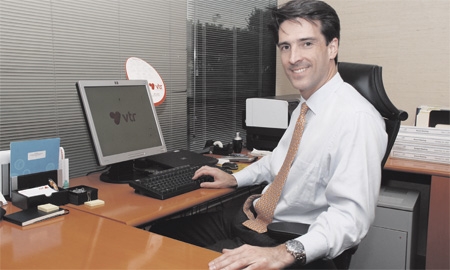In 2008, Mauricio Ramos proposed to the executives, managers and employees at the company he heads that they all climb Aconcagua, the highest mountain in the Americas. Why? To prove that nothing is impossible, of course, and that whatever one sets out to achieve must be done with great preparation and perseverance.
Of the 45 people who accepted the challenge, 25 reached the top in January 2009 and hoisted both the Chilean flag and the company’s banner. On their way down the mountain, Mr. Ramos received a phone call via satellite that would set the pace and strategy for his company over the next few years.
The message Mr. Ramos was given and that he shared with his fellow 24 hikers was that the Chilean Supreme Court had reformed the cellular phone industry, allowing for number portability and opening spectrum space for new competitors in addition to the three existing ones that had held on to their oligopy for 10 years.
As CEO of VTR Chile, a telecommunications company offering broadband Internet, fixed and long distance telephony, and digital television, Mr. Ramos welcomed this hallmark decision because it meant that his company could once again venture into new territory. And once again prove that nothing is impossible.
Back in the 1980s and 90s, VTR was mostly focused on cable TV. In the late 90s, however, the former CEO announced – to much criticism and skepticism within the industry, mostly due to the glaring fact that penetration was already near 100% – that VTR would enter the world of fixed telephony and broadband Internet. After a merger with Metropolis, VTR managed to grow into the second largest player, putting the pressure on the number one company, Spain’s Telefonica.
VTR once again faces this challenge: the cellular market is saturated, with 21 million customers in a country of under 18 million. Yet what skeptics ignore is the fact that today, VTR boasts an impressively strong fixed network, as well as ‘soft infrastructure’. The company is number one in PayTV, fixed broadband and fixed telephony within its footprint in Chile. VTR, ranked among Chile’s top 10 Great Places to Work, is also one of the most well known and highly regarded telecoms companies and has its own call center, a very large portfolio of loyal clients, a wide network of commercial offices, and local market knowledge. Lastly, VTR is backed by the expertise of its owner Liberty Global, which with over 20,000 employees globally, is one of the world’s largest media companies.
VTR had previously made huge waves in Chile when, in 1999, it became the first in Chile to offer ‘triple-play’ packages combining telephone, Internet, and digital television (today, nearly half a million customers subscribe to the ‘triple-play’ package). Eight years later, VTR launched South America’s first-ever high definition channel, called Vive HD, and last year released the country’s first 3D channel.
The innovation doesn’t stop there. In March this year, the company announced it was launching a higher bandwidth of Internet: 120 Mbps. “This has no equivalent in Chile nor in Latin America,” said Mr. Ramos in a recent interview with a Chilean newspaper. “And we’re not just talking about a network that covers a few thousand customers in Santiago. This is a coaxial fiber-optic cable network that will be in 2 million homes in Chile.”
In this regard, the CEO holds that Chile is a reliable destination for international investors like Liberty Global. “Chile decided on a development model based on free competition, that is a competitive advantage over other countries in the world and there is no doubt that it creates a favorable scenario for investment and innovation,” he comments.
VTR has invested around $400 million over the last two years, and a further $300 million are earmarked for this year. The coaxial fiber optic network, which is already in place between Arica in the north and Porvenir in the southern tip, will also serve as the foundation for VTR’s upcoming cellular phone network.

0 COMMENTS